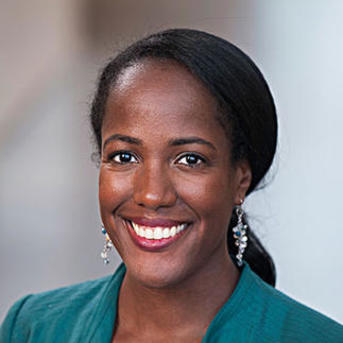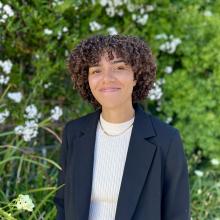CSDE Welcomes 4 New Research Affiliates in Fall Quarter 2024
Posted: 9/26/2024 (CSDE Research)

CSDE is pleased to introduce four of our new UW Research Affiliates! Audrey Dorélien, (Assistant Professor, Sociology) studies how human population dynamics and behavior intersect with environmental conditions. Jason Kerwin (Associate Professor, Economics) researches the choices people in developing countries make about health, education, employment, and savings. Morgan Vickers (Assistant Professor, Law, Societies, & Justice) researches radicalized ecologies, 20th century infrastructure projects, and eco-social repair. Sebastián Rubiano-Galvis (Assistant Professor, Law, Societies, & Justice) studies the political ecologies of extraction and toxicity and the politics of environmental knowledge, technology and legal expertise in Colombia and Latin America. Learn more about each affiliate in the full story!
- Audrey Dorélien – Audrey Dorélien is CSDE’s Training Core PI and a faculty member in the University of Washington’s Department of Sociology. Previously she taught at the Humphrey School for 10 years. Dorélien’s research agenda strives to elucidate how human population dynamics and behavior intersect with environmental conditions to affect health. Her work describes demographic and health patterns and attempts to identify causal factors responsible for these patterns. The first strand of her research focuses on the effects of early life exposures (i.e., disease/nutrition/climate) on health both in the United States and in Sub-Saharan Africa. Second, she analyzes how human behavior and population dynamics affect the spread and severity of infectious diseases. Third, Professor Dorélien has conducted research on spatial demography/ urbanization with a focus on health and climate change vulnerability. Her research has appeared in Population Development Review, Demography, Population Health Metrics, Biodemography and Social Biology, Demographic Research, and PLoS ONE. Prior to joining the Humphrey School, she was a Robert Wood Johnson Foundation Health & Society Scholar at the University of Michigan’s Population Studies Center and Center for Social Epidemiology and Population Health. She earned her PhD in Public Policy from Princeton University’s School of Public and International Affairs, with a concentration in demography from the Office of Population Research.
- Jason Kerwin – Jason Kerwin is currently a tenured Associate Professor in the Department of Economics and a Brimmer Distinguished Scholar at the University of Washington, an Affiliated Professor at J-PAL, and a Research Fellow at IZA. He received his Ph.D. in Economics from the University of Michigan, where he was also an Economic Demography Trainee at Michigan’s Population Studies Center. From 2015 to 2024 he was on the faculty of the Department of Applied Economics at the University of Minnesota. Jason’s research focuses on understanding the choices people in developing countries make about health, education, employment, and savings. To do this he combines randomized field experiments and other compelling causal inference methods with cutting-edge methods from econometrics and machine learning. Jason has done fieldwork in Malawi, Uganda, India, and Egypt. His papers have been published in journals that include the American Economic Review, the Journal of Econometrics, the Review of Economics and Statistics, and the Journal of Development Economics.
- Morgan Vickers – Morgan P. Vickers is an Assistant Professor of Race/Racialization in the Department of Law, Societies & Justice at the University of Washington. Vickers researches racialized ecologies, 20th-century infrastructure projects, and eco-social repair. Vickers received their Ph.D. in Geography from the University of California, Berkeley, and their B.A. in American Studies, Communication Studies, and Non-Fiction Writing from the University of North Carolina at Chapel Hill. Their work has been supported by the National Science Foundation, the National Trust for Historic Preservation, and the Black Studies Collaboratory. Vickers is currently a Content Editor for Environmental History Now and an Executive Board member of the Black Geographies Specialty Group of the American Association of Geographers (AAG). They previously worked with The Black Geographic, the National Trust for Historic Preservation, the Community Histories Workshop, A Red Record, and the Landscape Specialty Group of AAG.
- Sebastián Rubiano-Galvis – Sebastián Rubiano-Galvis is an Assistant Professor of Environmental Justice in the Law, Societies & Justice Department at the University of Washington in Seattle. He is affiliated with the Center for Environmental Politics and the Science, Technology, and Society Studies Interdisciplinary Group. He is also a Research Affiliate of the Human Contexts and Ethics of Data Program at UC Berkeley’s College of Computing, Data Science, and Society. Dr. Rubiano-Galvis is a researcher and educator at the intersection of critical environmental social sciences and science and technology studies. His work studies the political ecologies of extraction and toxicity and the politics of environmental knowledge, technology, and legal expertise in Colombia and Latin America. Broadly, he is interested in how science, technology, and the law shape and are shaped by people’s relations with their environments and resources, especially in polluted and extractive landscapes. He draws on concepts from political ecology, science and technology studies, and global environmental politics and use interpretive social science methods and qualitative analysis. His current research includes projects on the global governance of mercury and the “datification” of environmental education, science, and policy. His doctoral research studied the history and politics of mercury amalgamation in gold mining in Colombia and the broader circulation of said technique in the Americas over the last three centuries. His work has appeared in Environmental Impact Assessment Review, Ambix, and Triología: Ciencia, Tecnología y Sociedad, as well as in several edited volumes, and has been funded by Fulbright, UC Berkeley’s Center for Latin American Studies, and the US Department of Education.



